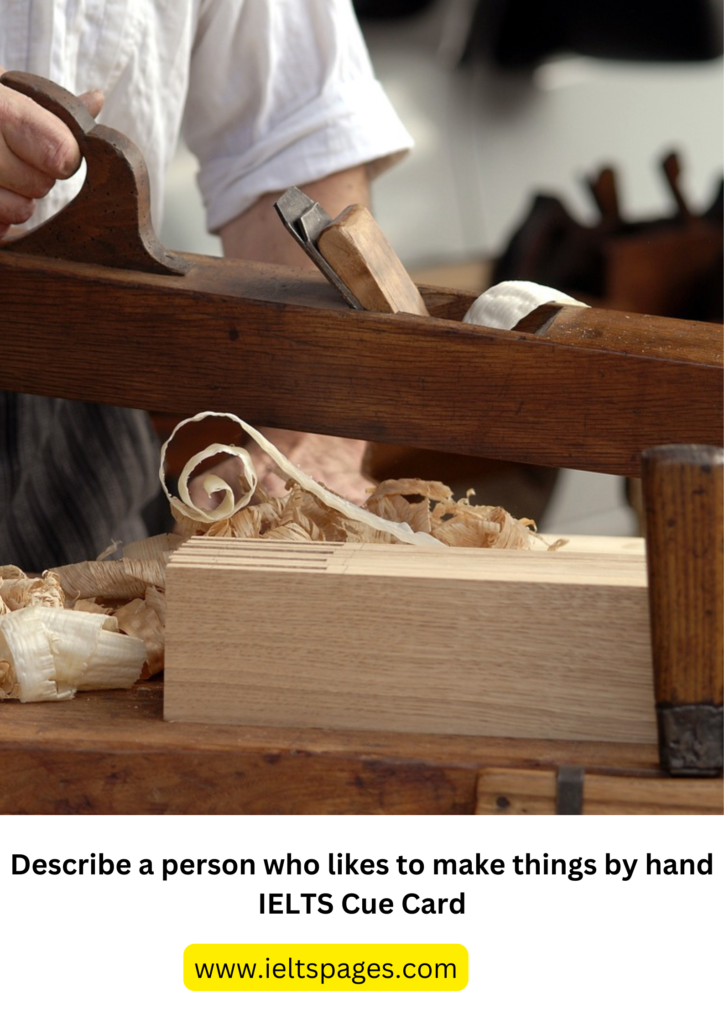
Describe a person who likes to make things by hand IELTS Cue Card
IELTS CUE CARD TOPIC
Describe a person who likes to make things by hand
(e.g. toys, furniture)
You should say:
- • Who this person is
- • What he/she makes
- • Why he/she likes to make things by hand
- • And explain how you feel about the person
Sample 1
In this modern era, most people thrive on machines to produce goods. In such a scenario, only a few people are left who love to do things by hand, and I’m fortunate to know a person who is good at it. This person is my uncle, he lives in my hometown, and he makes different articles from wood. My uncle, I wouldn’t say I like to waste anything.
So he connects the wooden waste from various industries, leaving small pieces of wood. Through that, he creates numerous decorative items. Sometimes, he creates mirror frames and key chains; sometimes, he makes tools and chairs from those wooden pieces.
I feel perfect about this person because the old art is still there and because people like him get a lot of inspiration from him. Moreover, his work is good for the environment because wood waste is put towards something worthwhile. Otherwise, this waste increases our efforts and harms our environment, too.
Sample 2
Although machines are used frequently in the modern era, some people still like to use their hands to make things. So here, I want to talk about someone who makes doors with his hands and uses excellent design.
Right now, the doors market is quite competitive, and people use CNC machines to create beautiful designs. After that, they painted it with the help of a machine so that the door looked very beautiful. But my friend, Andrew, is quite good at his art and does all the work by hand.
So first, he procures wood from the market, then cuts the wood into different portions, and then assembles those portions. After that, the first task he does is to do various kinds of carvings on the piece of wood, and it takes him weeks to do that on one door because it is a lengthy process and requires precision.
He does everything by hand, and he does not have any labour. After one month, he completed one door. When you compare the doors he produced with those made by a machine, you can see that his artwork is far ahead of the work he created because the doors he produced look repetitive and stereotyped, whereas all his designs are unique. And he has a creative mindset.
So, he never repeats one design he produces. So, every time he comes up with a new design. He likes to do things by hand because he thinks there is nothing; no machine can beat the human mind. Machines can work according to a program, but the human brain has unlimited capability; it can go anywhere. So that’s why he likes to do things by hand. I feel perfect about this person because of his craft, and I wish him all the best in his future endeavours.
Follow-ups
Here are some examples of follow-up questions that the examiner might ask during your speaking part 3 related to the cue card: “Describe a person who likes to make things by hand IELTS Cue Card”.
1. How does modern technology change the handicraft industry? Modern technology has brought in the handicraft industry. The first and foremost thing it has done is that it has made doing menial tasks easier. So, the artisans used to spend hours on specific tasks. Now, those tasks can be done in minutes.
Besides that, trying new designs has become very easy because the technology helps create new designs with various software programs. Moreover, for the handicraft industry, it’s straightforward to sell their products now because they have multiple marketplaces like Amazon, Clubcard, and various other platforms to sell their products.
2. Is it reasonable to charge a high price for handmade things?
Yes, it is reasonable to charge a high price for handmade things because they have exceptional value. When you produce products through machines, they all look the same, and significantly fewer efforts are involved.
So they are usual products. Handmade products are unique, and much effort and energy is put into them. So that’s why the artisans should be paid more for their efforts.
3. Are there any traditional handicrafts in your hometown?
Yes, there are many conventional handcrafts in my hometown. My hometown is in Punjab. So, phulkari embroidery is trendy there. Moreover, most of our designs use floral prints and vibrant colours. So that makes our designs unique and outstanding.
4. Why do many children like to make things by hand?
Children like to make things by hand because they love creativity, and in the budding years, they have less exposure to technology. So they find a lot of enjoyment in it because they take doing things hand as a pain. So, they enter a different zone where their creativity blossoms when they do many things while playing with their hand.
5. What are the benefits for students to learn to make things by hand? The benefits students get by learning to make things by hand is that they develop perfect hand-to-eye coordination. Moreover, the creativity inside them gets a boost. So, they learn to do things beyond the conventional domain, which helps them to lead their careers towards impressive growth.
6. Are traditional handicrafts important to tourism?
Yes, traditional handicrafts are very important for tourism because when people from other countries visit your place, they are not interested in shopping malls or amusement parks.
They want to learn more about culture and the traditional handicrafts. The conventional handicrafts sound more special to them; they want to take them as souvenirs in their country. So yes, traditional handicrafts are highly imperative for tourism.